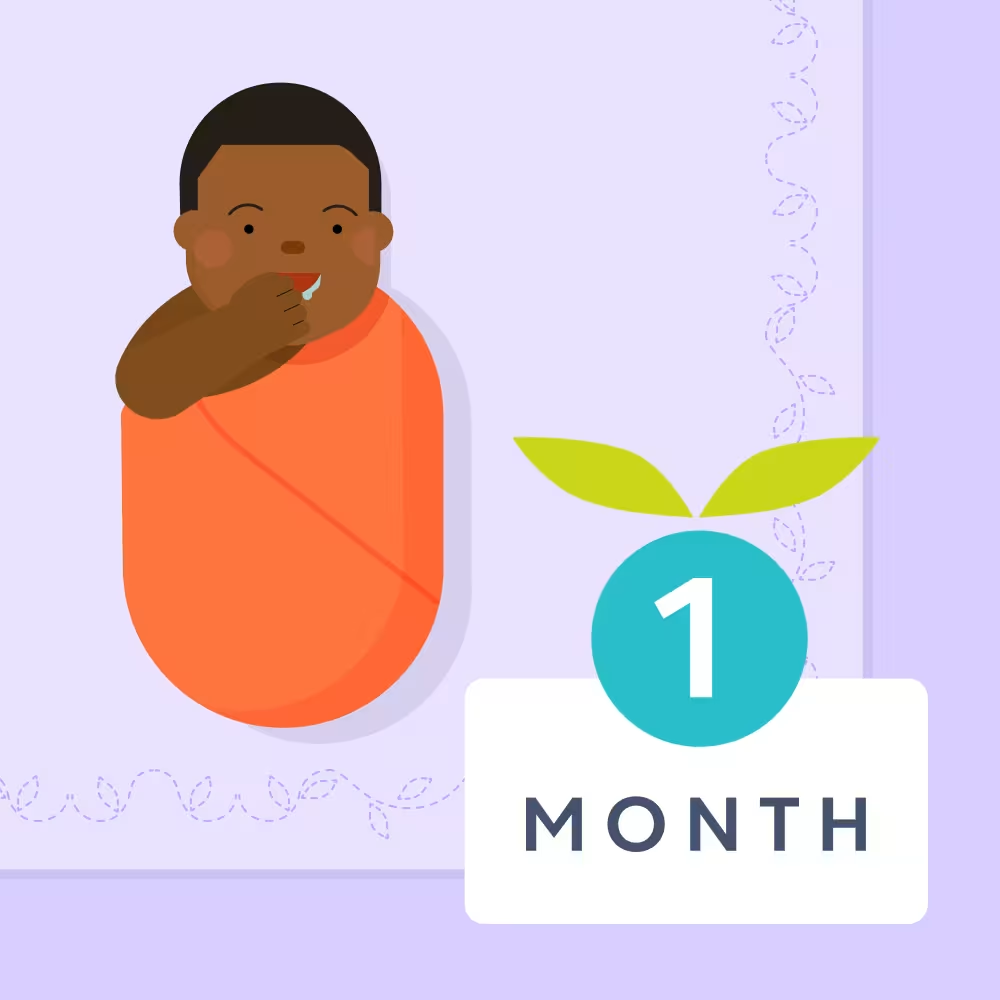The first-time parent’s guide to preparing for a baby
Updated Sep 23, 2025

Preparing for a baby is one of life’s most exciting (and let’s be honest, overwhelming) milestones. At this point, you may be juggling a hundred tasks: scouring baby registry deals and nursery Pinterest boards, avoiding unsolicited advice from relatives, or compiling recipes for freezer meals. And while no parent can be 100% prepared (spoiler alert: it’s not possible!), some planning goes a long way toward making those first few weeks a little easier.
However, you don’t need every fancy gadget or a color-coded spreadsheet to thrive as a new parent. What matters most is focusing on realistic expectations and simple systems that make life with a newborn more manageable — while prioritizing your emotional well-being. Here’s a guide for expecting parents on how to prepare for the newborn stage before baby arrives.
Why it's important to prepare for postpartum
When we talk about “getting ready for baby,” the focus usually lands on the best bottles to use, adorable tiny onesies, and strollers. But here’s the truth: preparing for postpartum recovery is just as important (if not more). Those first few weeks aren’t just about caring for your newborn — they’re also about healing (physically and emotionally) while finding your footing as a parent.
Think of it this way: you wouldn’t run a marathon without some training, setting up water stations, and a recovery plan. In a similar vein, having practical resources, support teams, and a flexible mindset in place makes the transition into parenthood smoother. A parent’s mental health after birth plays a role in their baby’s development [], so taking care of you means taking care of your baby, too.
Most common mistakes expectant parents make in preparing for baby
Many new parents unknowingly make choices that add extra stress later on. Mistakes happen, especially when we are stepping into brand-new territory. The good news? Every parent learns as they go (including you!). Knowing a few common mistakes ahead of time can help you sidestep them.
Overbuying gear you don’t actually need: (Looking at you, wipe warmers.) Stick to the basics — you can always add more later if needed. And if you really end up loving a product (even if it’s wipe warmers)? Amazing! You’ve found what works for you.
Focusing only on the baby, not the parents: Your sleep and meals matter just as much as your baby’s in those early days. Planning ahead can set you up for success — more on this below.
Skipping conversations about roles and expectations: Who’s managing laundry? What are your expectations of what a “clean” house looks like? How much alone time do you ideally want? Talking now saves tension later. These conversations can happen with your partner or a member of your support team (like a friend or family member willing to help).
Not building a flexible plan: Sometimes being too set on things like the perfect birth experience or how and when your baby will sleep can quickly lead to new parents feeling overwhelmed.
Comparing yourself to others: Every pregnancy, birth, and postpartum experience is different — and so is every parent. You may not see the full picture of the support or resources others have, or what’s happening behind the scenes.
Essential tips for expectant parents
Can we let you in on a little secret? You don’t need to have everything figured out before your little one arrives. Not even what’s the right stroller to fit your car seat. Seriously.
The goal isn’t perfection, rather you’re setting a foundation for you to feel a little less overwhelmed — knowing you can ask for help and prioritize your care, too.
These aren’t meant to be another checklist to stress over. Think of them as a few extra tools in your toolbelt that you can pull out at any time. Your future self (sleep-deprived, snack-hunting, and snuggling a newborn) will thank you.
Tip #1: Stock the freezer like it’s your job
Meal prep might not feel glamorous, but it’s one of the most loving things you can do for your future self. Fill your freezer with easy-to-heat meals — casseroles, soups, slow-cooker packs, or smoothie kits. Even a frozen pizza counts.
Tip #2: Create “baby stations” around the house
Save yourself from trekking back and forth at 3 AM by setting up mini changing and feeding stations in the rooms you spend the most time in. A basket with diapers, wipes, burp cloths, and a spare onesie can be a total sanity saver.
Tip #3: Prep your support system
Make a list now of people you can lean on later — friends who love to cook, family members who can run errands, or a neighbor who’s happy to walk your dog. If it’s within your means, consider hiring help, like a postpartum doula or night nurse. The key is knowing who to call when you need backup. (Because, yes, you will need backup.)
Tip #4: Learn the basics, but don’t aim for mastery
Yes, it’s helpful to practice swaddling on a stuffed animal. But you don’t need to master every skill before the baby arrives. Focus on an overview of the essentials — like , , and diapering. And remember that you’ll learn a ton once you’re on the job.
Tip #5: Prioritize sleep hygiene early
You may not get long stretches of sleep once the baby is here, but you can set up a restful environment now. Often we think of bedtime routines for babies, but it’s worth considering for you, too! What might it be like to sleep with blackout curtains, a white noise machine, and cozy bedding? Water next to you? Tea before bed? Building a calming before the baby arrives helps you transition more easily into broken sleep later.
Tip #6: Discuss expectations for night feeds
Talking openly with your partner (or a trusted support person) about what will realistically look like helps set everyone up for success. Even if the plan doesn’t go perfectly (spoiler: it won’t), knowing you’re in it together makes those long nights feel a little lighter.
Think through questions like:
Who will get up with the baby, and when?
If one person feeds, can the other handle soothing or diaper changes?
Will you try shifts (for example: one person covers 10 PM - 2 AM and the other 2 AM - 6 AM)?
What happens on especially tough nights — do you have a “backup plan” for extra rest the next day?
Tip #7: Have a postpartum recovery kit ready
Caring for your body is as important as caring for your baby. Stock a basket with essentials like a peri bottle, comfy high-waisted underwear, pads, pain relief spray, nipple cream, and easy snacks. Place it somewhere within arm’s reach. You’ll be glad you did.
If you’re the non-birthing parent, you can have your own postpartum kit, too, with snacks, electrolyte packets, fidget toys, and anything else that calms you or prioritizes your physical health.
Tip #8: Practice saying “yes” and “no”
Visitors will want to come meet your baby, and offers of help will roll in. Decide now what feels good for your family. Saying yes to a meal drop-off and no to a houseful of guests is perfectly OK. Boundaries are part of survival.
How to prepare your relationship for baby
Pregnancy is a season of constant change — not just physically, but emotionally. Your relationship may feel stretched as you navigate doctor’s appointments, hormonal shifts, planning for a newborn, and increased responsibilities. One of the best ways to prepare is to intentionally carve out time to connect, even in small ways. Simple rituals like sharing a cup of coffee in the morning or texting each other a “Thank you for unloading the dishwasher” can help you feel like a team before the chaos of baby life begins.
It’s also important to talk openly about fears and hopes. Conversations about parenting philosophies, financial concerns, expectations for life after a baby comes, and how you want to involve your families aren’t always easy. Waiting until you’re surviving on coffee and 2-hour naps can make clear decisions feel a lot harder.
These conversations could look like:
What values are most important to you as a family?
Who will handle household chores?
What check-ins can you put in place to stay connected as a couple?
Who can you call for support if either of you gets sick or needs a break?
What are the signs that each of you is not feeling like yourself — maybe more depressed or more anxious?
Who will handle appointments or pediatrician questions?
Who gets downtime, when, and for how long?
How will you protect space for each of you to prioritize self-care?
A guide for first-time parents
Stepping into parenthood for the first time can feel like diving into the deep end without swimming lessons. But again, you don’t need to know it all ahead of time. Your baby will be the best teacher, rather than the parenting books that might be piled on your dresser.
Here are some guiding principles for first-time parents:
Keep it simple. You don’t need to know every statistic or parenting hack to be an amazing parent. Give yourself permission to learn as you go.
Ask for help. A solid support team makes a huge difference in the mental health of new parents []. The best part? You can define what support looks like to you.
Trust your instincts. No one knows your baby quite like you do. Confidence grows with experience.
Expect surprises. Babies have their own timelines and personalities, and birth doesn’t always go how we’ve envisioned.
Care for yourself, too. Your rest, meals, and physical recovery are just as important as your baby’s needs.
You’ll discover your own rhythm in time. Confidence will grow naturally as you go. Some days will feel harder than others, and that’s completely normal. Be gentle with yourself. You’re doing better than you think. You’re here taking the time to read this article after all!
Takeaway
Plan, but don’t overplan. Preparing for a baby is about setting up a foundation rather than perfection. Focus on simple systems that make the early weeks more manageable. And leave wiggle room for flexibility.
Prioritize your well-being. Your physical and emotional health matters too. Taking care of yourself isn’t selfish. It actually plays a key role in your baby’s development.
Now is the perfect time to talk about roles around the house, expectations for after the baby comes, and ideas for family involvement. You can also take the time to nurture your relationship and practice being a united front for the newborn stage.
Trust yourself and embrace the learning curve. No parent gets it perfectly right the first time (or the third time), and that’s OK. Your instincts have value to them. You’ll know your baby best.
Share article:
Note: The content on this site is for informational purposes only and should not replace medical advice from your doctor, pediatrician, or medical professional. If you have questions or concerns, you should contact a medical professional.
2 Sources
Share article:






